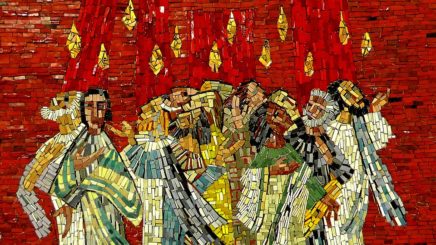
This past Sunday, churches across the globe celebrated Pentecost, the day we as Christians mark the arrival of the Holy Spirit after the death, resurrection and ascension of Christ. As I have considered the significance of this time in history and this moment in ours, I am drawn to a place of reflection, resilience and hope.
The vibrant Mexican immigrant barrio of La Villita has been home to my family these past 28 years. I love my neighborhood. Although many of my neighbors work low-paying jobs, family members come together and establish themselves to buy homes, start businesses and fill churches on Sunday mornings to express their faith in God. Against so many odds, I am amazed at the resilience and determination that motivates my neighbors to provide for their families, especially those that are here without papers. Anti-immigrant rhetoric and fear of deportation has replaced the hope for immigration reform. Even in an immigrant-friendly city like Chicago, our communities are growing weary of waiting. Will relief come?
Even in an immigrant-friendly city like Chicago, our communities are growing weary of waiting. Will relief come?
Across the viaduct and train tracks is the North Lawndale neighborhood. In North Lawndale, African-American residents wait to be included in the flourishing of Chicago’s prosperity. They wait for the long arc of justice to set young men free from police brutality and harassment and from the destructive impact of harsh criminalization of young Black men. How much longer can mothers and fathers continue to wait for their children to live without fear?
Pentecost Sunday reminds us that waiting is a common experience that bonds us as human beings across the ages. As Christ-followers, waiting on God is all too familiar. We are a people called to wait. We are called to wait even in the midst of divisions, hatred and injustice. We are called to wait, yet actively engage in prophetic witness that proclaims and demonstrates the goodness of God.
Called to wait
Before ascending into the heavens, the risen Jesus instructed his small band of followers to wait in Jerusalem for the coming of his Spirit (Acts 1:4-5). We then see Luke’s description of the Holy Spirit’s arrival in the second chapter of Acts. What we refer to as Pentecost was the birth of a multi-cultural, multi-lingual fellowship!
On the day of Pentecost all the believers were meeting together in one place. Suddenly, there was a sound from heaven like the roaring of a mighty windstorm, and it filled the house where they were sitting. Then, what looked like flames or tongues of fire appeared and settled on each of them. And everyone present was filled with the Holy Spirit and began speaking in other languages, as the Holy Spirit gave them this ability. At that time there were devout Jews from every nation living in Jerusalem. When they heard the loud noise, everyone came running, and they were bewildered to hear their own languages being spoken by the believers. They were completely amazed. “How can this be?” they exclaimed. “These people are all from Galilee, and yet we hear them speaking in our own native languages! Here we are—Parthians, Medes, Elamites, people from Mesopotamia, Judea, Cappadocia, Pontus, the province of Asia, Phrygia, Pamphylia, Egypt, and the areas of Libya around Cyrene, visitors from Rome (both Jews and converts to Judaism), Cretans, and Arabs. And we all hear these people speaking in our own languages about the wonderful things God has done!” They stood there amazed and perplexed. “What can this mean?” they asked each other. But others in the crowd ridiculed them, saying, “They’re just drunk, that’s all!”
~ Acts 2:1-13
It is impossible to reflect on the story of Pentecost and not be blown away by the intent of God to include all peoples, every nation in his Kingdom endeavor. Beginning with a small, unimpressive band of Galilean Jews, the Church that Jesus came to commission and accompany into the world was to be characterized by its love, its inclusiveness and its diversity. All barriers would be broken down because of Jesus’ resurrection, and through the presence of the Holy Spirit, His followers individually, and more importantly, collectively.
It is impossible to reflect on the story of Pentecost and not be blown away by the intent of God to include all peoples, every nation in his Kingdom endeavor.
When the Spirit descends providentially, God-honoring Jews and converts from every point of the compass came to celebrate the goodness of God and the beginning of the wheat harvest. During this significant time of celebration, God pours out His Spirit, declares the Good News of His Kingdom and love, and does so in a way that reaches beyond every cultural expression, enabling His Galilean followers to speak the languages of everyone close enough to hear the words being expressed. In that moment, God’s promise to Abraham that he would be the father of many nations was being fulfilled!
Today, we wait to see this expression of diversity and inclusiveness be demonstrated in its fullness by Christ-followers. Many long to see the Church be the unequivocal champions for righteousness and justice and embody what it means to live together as brothers and sisters. We hope for the guiding force of our engagement as Christians to reflect the Spirit that descended on a rag-tag group of Jesus followers, coming together as one.
A radically diverse community
Not only does the Spirit empower us to extend the love of God to every corner of the world, it compels us to love those that come to us from beyond our borders. Not only are we expected to be used by God to share the Good News with our preaching so that the lost might be saved, but radically, we are called to integrate men and women from every nation into our fellowship in Christ.
Those who believed what Peter said were baptized and added to the church that day—about 3,000 in all. All the believers devoted themselves to the apostles’ teaching, and to fellowship, and to sharing in meals (including the Lord’s Supper), and to prayer. A deep sense of awe came over them all, and the apostles performed many miraculous signs and wonders. And all the believers met together in one place and shared everything they had. They sold their property and possessions and shared the money with those in need. They worshiped together at the Temple each day, met in homes for the Lord’s Supper, and shared their meals with great joy and generosity — all the while praising God and enjoying the goodwill of all the people. And each day the Lord added to their fellowship those who were being saved.
~Acts 2:41-47
On the day of Pentecost, the small and safe community of mostly Galilean converts swelled with the addition of 3,000 diverse followers of their Nazarene Savior. This new unity resulted in joint worship, new relationships and new economic practices. It was a new, beloved community that was inclusive and diverse. What started at Pentecost was accelerated by the Apostle Paul as he championed the expansion of the Church into the Gentile world. Suffice it to say, it was not easy to embrace a sustained commitment to this radically diverse community.
As we consider our place in our communities and churches today, I want to challenge all of us to remember and employ the lessons from Pentecost that are key to the work we are called to do in under-resourced communities throughout our nation. We serve a God who calls us to be agents of love and justice, and through the coming of His Spirit calls us to wait with hope, to go out and declare His goodness in a way that everyone, especially the poor, can be included.
Noel Castellanos is president of the Christian Community Development Association.


